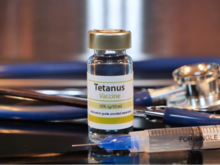Tetanus is an infection caused by a bacterium called Clostridium tetani. Spores of tetanus bacteria are everywhere in the environment, including soil, dust, and manure. The spores develop into bacteria when they enter the body. Unlike other vaccine-preventable diseases, tetanus is not spread from person to person.
The spores can get into someone’s body through broken skin, usually through injuries. Tetanus bacteria are more likely to infect certain breaks in the skin.
Vaccines are available that help prevent tetanus, an infection caused by Clostridium tetani bacteria.
Employees working in facilities management, health care or animal research environments should be knowledgeable of the date of their tetanus immunization- usually received in 3 doses during childhood. If one is unsure of the date, a booster dose is recommended as well as every ten years thereafter to maintain protective antibodies against tetanus. Tetanus toxoid injection is often combined with Diphtheria vaccine (Td).
Always seek prompt medical attention for any wounds, as a booster may be recommended sooner than ten years. All work-related injuries should be reported to your supervisor, and an EH&S Incident Report should be completed.
